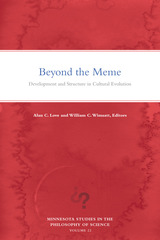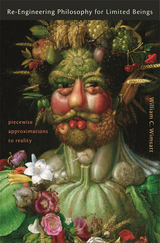
Interdisciplinary perspectives on cultural evolution that reject meme theory in favor of a complex understanding of dynamic change over time
How do cultures change? In recent decades, the concept of the meme, posited as a basic unit of culture analogous to the gene, has been central to debates about cultural transformation. Despite the appeal of meme theory, its simplification of complex interactions and other inadequacies as an explanatory framework raise more questions about cultural evolution than it answers.
In Beyond the Meme, William C. Wimsatt and Alan C. Love assemble interdisciplinary perspectives on cultural evolution, providing a nuanced understanding of it as a process in which dynamic structures interact on different scales of size and time. By focusing on the full range of evolutionary processes across distinct contexts, from rice farming to scientific reasoning, this volume demonstrates how a thick understanding of change in culture emerges from multiple disciplinary vantage points, each of which is required to understand cultural evolution in all its complexity. The editors provide an extensive introductory essay to contextualize the volume, and Wimsatt contributes a separate chapter that systematically organizes the conceptual geography of cultural processes and phenomena.
Any adequate account of the transmission, elaboration, and evolution of culture must, this volume argues, recognize the central roles that cognitive and social development play in cultural change and the complex interplay of technological, organizational, and institutional structures needed to enable and coordinate these processes.
Contributors: Marshall Abrams, U of Alabama at Birmingham; Claes Andersson, Chalmers U of Technology; Mark A. Bedau, Reed College; James A. Evans, U of Chicago; Jacob G. Foster, U of California, Los Angeles; Michel Janssen, U of Minnesota; Sabina Leonelli, U of Exeter; Massimo Maiocchi, U of Chicago; Joseph D. Martin, U of Cambridge; Salikoko S. Mufwene, U of Chicago; Nancy J. Nersessian, Georgia Institute of Technology and Harvard U; Paul E. Smaldino, U of California, Merced; Anton Törnberg, U of Gothenburg; Petter Törnberg, U of Amsterdam; Gilbert B. Tostevin, U of Minnesota.

Analytic philosophers once pantomimed physics: they tried to understand the world by breaking it down into the smallest possible bits. Thinkers from the Darwinian sciences now pose alternatives to this simplistic reductionism.
In this intellectual tour--essays spanning thirty years--William Wimsatt argues that scientists seek to atomize phenomena only when necessary in the search to understand how entities, events, and processes articulate at different levels. Evolution forms the natural world not as Laplace's all-seeing demon but as a backwoods mechanic fixing and re-fashioning machines out of whatever is at hand. W. V. Quine's lost search for a "desert ontology" leads instead to Wimsatt's walk through a tropical rain forest.
This book offers a philosophy for error-prone humans trying to understand messy systems in the real world. Against eliminative reductionism, Wimsatt pits new perspectives to deal with emerging natural and social complexities. He argues that our philosophy should be rooted in heuristics and models that work in practice, not only in principle. He demonstrates how to do this with an analysis of the strengths, the limits, and a recalibration of our reductionistic and analytic methodologies. Our aims are changed and our philosophy is transfigured in the process.
READERS
Browse our collection.
PUBLISHERS
See BiblioVault's publisher services.
STUDENT SERVICES
Files for college accessibility offices.
UChicago Accessibility Resources
home | accessibility | search | about | contact us
BiblioVault ® 2001 - 2024
The University of Chicago Press









